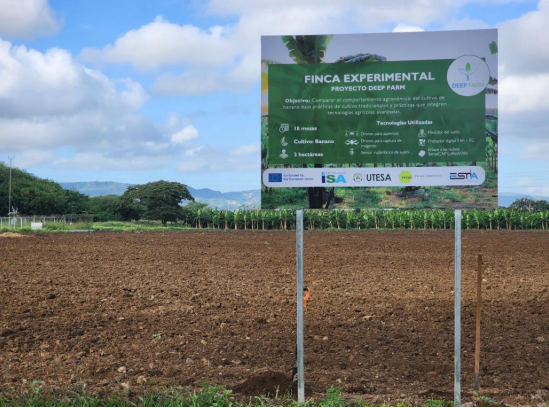Deep Farm Dominican Republic: A Smart Farm Designed for Learning and Innovation

The DEEP Farm project is an international initiative aimed at integrating advanced technology into agricultural practices worldwide. One of the key components of this ambitious project is the agricultural work taking place in the Dominican Republic, led by ISA University in collaboration with UTESA. This partnership is setting a benchmark for smart farming techniques, highlighting the interaction between technology and agriculture through student practical activities.
Establishing a Model Banana Farm in the Dominican Republic
A cornerstone of the Deep Farm project in the Dominican Republic is the creation of a model banana farm. This farm serves not only as an experimental field but also as an educational platform where students and professionals are trained in the efficient use of agricultural technology.
Site Selection: Overcoming Initial Challenges
The process of selecting the ideal site for the farm was rigorous. The initially evaluated location presented challenges, including poor drainage and water scarcity. To ensure optimal conditions, an alternative site was chosen based on:
-
Enhanced water retention capabilities: Ensuring a reliable water source for the irrigation system.
-
Favorable topography: Facilitating furrow planning and natural drainage.
-
Geospatial validation: GIS tools were employed to analyze slopes, drainage patterns, and accessibility to confirm suitability.
Land Preparation for Cultivation
Once the site was selected, extensive land preparation began:
-
Mechanical clearing: Removal of vegetation and stones to optimize land use.
-
Soil leveling: Creating a uniform surface to support irrigation and planting.
-
Furrow layout: Strategically designed to prevent erosion and enhance water distribution.
Integration of Smart Agricultural Technology
The DEEP Farm project integrates advanced monitoring tools to optimize resource use and improve crop performance. Key technologies include:
-
Seeed Studio SenseCAP S2105: A LoRaWAN-based sensor for measuring soil moisture, temperature, and electrical conductivity.
-
SenseCAP LoRaWAN Gateway: A cloud-connected gateway enabling seamless data transmission for remote monitoring.
-
ECOWITT WH51L: A soil moisture sensor with a 1-meter probe for deep analysis.
-
AmbientWeather WS-2902: A professional weather station tracking temperature, humidity, wind, and UV radiation to support precision farming.
Training and Capacity Building
To maximize the impact of these innovations, comprehensive training sessions were organized:
-
GIS Training for Topographical Surveys: Enabling participants to analyze slopes and contour lines for efficient land use.
-
Workshop on Agricultural Sensors: Hands-on learning for sensor installation and data interpretation.
-
Advanced Programming Courses: Covering R for agricultural data analysis and Python for predictive modeling.
-
Autodesk ReCap Pro Workshop: Teaching 3D mapping techniques for precise crop planning using drone-captured images.
Progress and Future Prospects
While key activities such as irrigation system installation are still in progress, the foundation for a highly digitized model farm has been established. As the banana planting phase is set for late January and early February, the project continues to pave the way for a technologically advanced and sustainable agricultural future.
As part of the broader DEEP Farm initiative, similar efforts are being made in different regions, adapting technology to local agricultural needs and environmental conditions.

